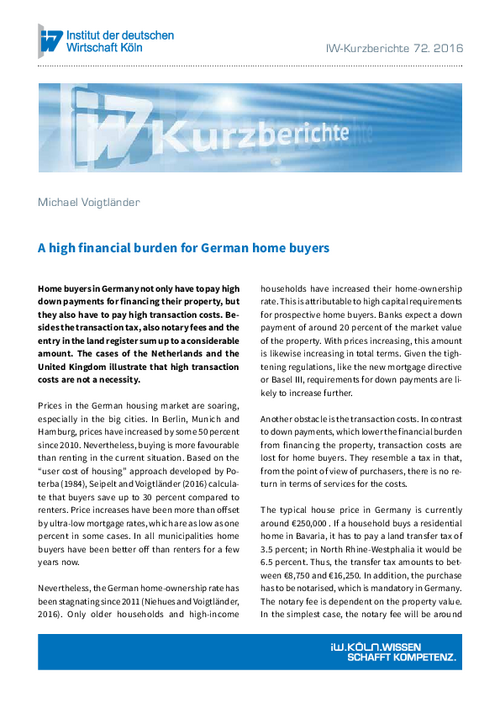Home buyers in Germany not only have to pay high down payments for financing their property, but they also have to pay high transaction costs. Besides the transaction tax, also notary fees and the entry in the land register sum up to a considerable amount. The cases of the Netherlands and the United Kingdom illustrate that high transaction costs are not a necessity.

A high financial burden for German home buyers
IW-Kurzbericht

Home buyers in Germany not only have to pay high down payments for financing their property, but they also have to pay high transaction costs. Besides the transaction tax, also notary fees and the entry in the land register sum up to a considerable amount. The cases of the Netherlands and the United Kingdom illustrate that high transaction costs are not a necessity.
Prices in the German housing market are soaring, especially in the big cities. In Berlin, Munich and Hamburg, prices have increased by some 50 percent since 2010. Nevertheless, buying is more favourable than renting in the current situation. Based on the “user cost of housing” approach developed by Poterba (1984), Seipelt and Voigtländer (2016) calculate that buyers save up to 30 percent compared to renters. Price increases have been more than offset by ultra-low mortgage rates, which are as low as one percent in some cases. In all municipalities home buyers have been better off than renters for a few years now.
Nevertheless, the German home-ownership rate has been stagnating since 2011 (Niehues and Voigtländer, 2016). Only older households and high-income households have increased their home-ownership rate. This is attributable to high capital requirements for prospective home buyers. Banks expect a down payment of around 20 percent of the market value of the property. With prices increasing, this amount is likewise increasing in total terms. Given the tightening regulations, like the new mortgage directive or Basel III, requirements for down payments are likely to increase further.
Another obstacle is the transaction costs. In contrast to down payments, which lower the financial burden from financing the property, transaction costs are lost for home buyers. They resemble a tax in that, from the point of view of purchasers, there is no return in terms of services for the costs.
The typical house price in Germany is currently around €250,000 . If a household buys a residential home in Bavaria, it has to pay a land transfer tax of 3.5 percent; in North Rhine-Westphalia it would be 6.5 percent. Thus, the transfer tax amounts to between €8,750 and €16,250. In addition, the purchase has to be notarised, which is mandatory in Germany. The notary fee is dependent on the property value. In the simplest case, the notary fee will be around 0.8 percent of the property value. If a mortgage loan also has to be accounted for, and if the notary serves as a trustee for the transaction, which is typical in Germany, the fee amounts to at least one percent. Finally, the entry in the land registry costs an additional 0.3 to 0.5 percent, depending on the case. All in all, this amounts to transaction costs between 4.6 and 8.0 percent, which is the equivalent of between €11,500 and €20,000. The cost of a real estate agent would increase the transaction costs considerably; but since the use of housing brokers is not mandatory, they are left out of the calculation.
The examples of other countries illustrate that such high transaction costs are not necessary (see table). In the Netherlands the land transfer tax has been lowered to 2 percent. A notary is also mandatory, but costs are considerably lower than in Germany. In Germany, notaries use to link their fees to the property value and fix fees for all notaries via their organisation. In the Netherlands, the market for notaries has been deregulated, and they are no longer allowed to fix prices. As a result, notary fees have been reduced. According to independent comparison sites, the price ranges between €700 and €1,000, independent of the property price. Prices for the land registry are also fixed. In a typical case it should be well below €575, which is at least €225 cheaper than in Germany.
It is even cheaper to buy a home in the United Kingdom. There, the transfer tax for a property with a value of £215,000 (around €250,000) is only 0.8 percent. Unlike in Germany and the Netherlands, there is no flat tax on property, but there is a progressive tax rate. For all purchases there is a tax exemption level of £125,000. For the next £125,000 a tax rate of 2 percent is applied, and for the next £675,000 the tax rate is 5 percent. This insures that the tax burden is not prohibitive, especially for lower-income households that typically buy lower-priced homes. Another characteristic of the British system is that notaries are not needed. The documentary process is known as conveyancing, and it is done either by specialist conveyancers or more usually by solicitors. The costs, including land registry, amount to less than £1,000. Land registry itself amounts to £135 plus the cost for various searches (examination of public records), which can be about £250.
In total, households in the Netherlands pay a maximum of €6,500 and in the United Kingdom only €3,250 for a property with a value of €250,000. Compared to German households, they save up to €13,500 or even €16,750, respectively. This constitutes capital that could be used for a down payment, for example.
What lessons can be learned from this international comparison?
First of all, transaction costs are really high in Germany. Of course, the situation might be even worse in other countries, like in Spain or Italy with even higher taxes, but Germany is well advised to compare itself to countries with lower transaction costs. Especially since in Germany the wealth formation of low-income households is underdeveloped, and since collective pension systems, whether statutory or provided by corporates, are under pressure.
Secondly, the transfer tax exerts the highest burden. Consequently, tax rates should be lowered considerably. However, the transfer tax is privileged in the fiscal equalisation scheme between the federal government and the Länder, since the Länder do not have to share tax revenues from the transfer tax. Thus, the Länder have a strong incentive to increase the tax. Nevertheless, a progressive tax system like that in the UK could be a solution. A tax exemption limit could help first-time buyers who aim to purchase cheap or small homes and who have not had enough time to save capital. Furthermore, households should be allowed to extend the tax payment over a set period – for instance, of ten years. This would enable more households to afford a home.
Finally, land registry costs and notary fees are extraordinarily high in Germany. Further research is needed to evaluate why land registration in Germany is more costly than in other countries. In addition, the role of notaries should be discussed. Most contracts are standardised so that it is not self-evident why notaries are required, especially since British households save so much money. The Dutch experiment of liberalising the notary profession is also a re-form project worth being discussed. At least the link between land registry and notary fees on the one hand, and property value on the other, should be addressed. Notaries and land-registry offices participate in the booming market while their costs remain the same. Such windfall profits at the expense of home buyers should be avoided.
A critical review of transaction costs and an adoption of other countries’ best-practise examples could help to lower barriers to home-ownership for many households. This would especially allow low-income households and families to participate in the opportunities provided by the ultra-low mortgage rate environment.

Michael Voigtländer: A high financial burden for German home buyers
IW-Kurzbericht


Inflation: Rentner nicht stärker betroffen als andere Haushalte
Die Kaufkraft von Rentnern der Gesetzlichen Rentenversicherung sank in den vergangenen Jahren nicht stärker als bei anderen Haushalten. Während die Coronapandemie Rentner nicht so stark getroffen hat, führten die Preissteigerungen spätestens seit 2022 zu ...
IW
Oxfam-Studie: An der Realität vorbei
Auch in diesem Jahr prangert die Hilfsorganisation Oxfam pünktlich zum Weltwirtschaftsforum in Davos die angeblich steigende Ungleichheit der Vermögen an. Doch die Zahlen zur Entwicklung der Vermögensungleichheit in Deutschland zeichnen ein anderes Bild, ...
IW